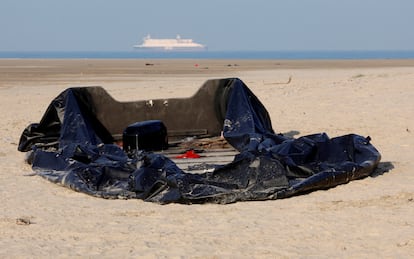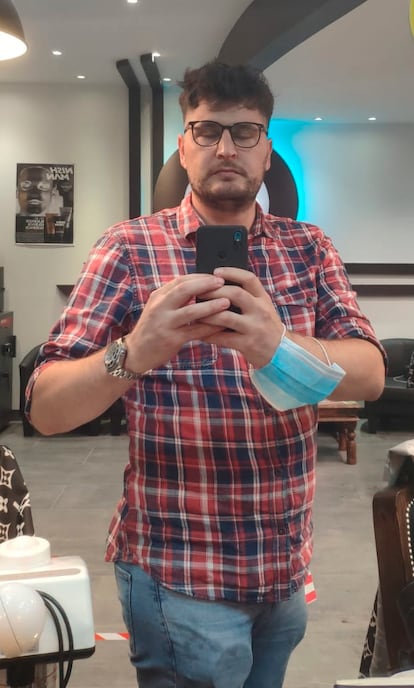The English Channel: the last hope for desperate migrants
In 2022, over 84,500 people have attempted the dangerous crossing into the UK from the northern shores of France. Only half have made it


For Ali, the beach of Calais in northern France is the most disturbing place in all of Europe. “You know the danger is behind, but also ahead,” the Iranian asylum seeker, now living in London, says over the phone. It was in those infinite sands that a year and a half ago Ali, 29, found himself face to face with death. “At that moment you look back, at Iran, at Greece, at Germany, at France, and you see the danger,” he says, thinking about his journey to the United Kingdom. “But then you look ahead and you see the English Channel in front of you. I didn’t know what to do. I thought to myself: ‘If I die, I die. It’s OK.”
Like Ali, more than 84,500 people risked their lives trying to cross the waters of the English Channel in rubber boats in 2022. According to data from the European Commission, just over 44,000 succeeded. Arrivals in the United Kingdom through this irregular, dangerous route have resulted in such a massive increase in the migratory flow (8,400 crossed in 2020, according to official figures) that it has driven Paris, London and Brussels to increase border control and surveillance in the barely 30 miles that separate France from the UK. At the same time, London has just resumed a controversial plan to deport undocumented migrants to Rwanda. It is in the African country – almost 6,000 miles from London – where they must start the asylum application process.

Given the rise in arrivals via this icy route – the water temperature rarely exceeds 32º Fahrenheit – the French authorities have stepped up the police presence in its waters and on its beaches, from where the mafias send shipments of migrants in shabby dinghies, and sometimes even kayaks. Ali openly explains how it works: “I paid a Kurd €3,000 to tell me where to go. He sent the location; it was an area near the beach where we waited for five, six, seven hours, until he confirmed that the situation was safe,” he recalls. “He pointed out a spot where there was a boat buried in the sand. We all had to dig it out, put the engine on it, and so on. It took us about two hours. Afterwards, we carried the dinghy to the shore on our shoulders.” Ali says there were 26 people, six women and two children among them. “We didn’t know what to expect or where to go. We didn’t know the route. We were in the middle of nowhere, not even knowing how to navigate.” One of the migrants knew a little about navigation, and he immediately became a kind of captain while the rest did whatever they could, like consulting Google Maps to confirm that they were heading for British shores.
“At that moment you are so stressed out that you are just quiet. We looked at each other, the children slept, nobody spoke. We needed silence,” recalls Ali, who explains that he fled his homeland “for religious reasons.” He lived in Shiraz, in southern Iran, with his parents and sister, who is studying medicine. He had it all: a job as a civil engineer, a car... “I had no problems,” he says. Then he decided to abandon Islam and convert to Bahaism, which caused the Iranian authorities to go after him.
Jaleel, a 32-year-old Syrian who says he has regained control of his life in Liverpool, where he lives as a refugee and is studying the final year of mechanical engineering degree, tells a similar story. After the usual journey through Turkey, Greece, Germany, and in his case the Netherlands, he reached (“like everybody,” he says) the beaches of Dunkirk, in northern France. It was July 2020.

“There you find people like me. You ask anyone for a smuggler who can help you cross into the UK and people give you a contact,” he continues. Jaleel’s trafficker was also a Kurd. He asked him for £2,500 to secure a seat in a boat no more than four meters long. “We were 16 adults and two children. We couldn’t even move,” he recalls. Jaleel, a native of Afrin, in Turkish-occupied Syrian Kurdistan (the main reason he fled to Europe in February 2016), crossed the channel one clear summer night in which some lights were visible on the horizon. They were beacons signaling the British coast: “That told us that the United Kingdom was there. We knew we had to go there.” This kept them from losing their way. He also knew how to swim, which made him feel safer.

But Jaleel’s journey could well have ended in tragedy, like that of December 14, when one of these small dinghies that crosses the English Channel almost every day sank, leaving four dead; or the one from a year earlier in which 27 people drowned. “At 4am, the waves were so high that the water entered the boat. We were going to sink. People were crying, thinking this was the end. It was terrifying.” Finally, Jaleel and the other 15 migrants were rescued and taken to Dover, in the county of Kent.
The last resort
These crossings, which increasingly include Albanian, Afghan and Iranian citizens, according to official British figures, are generally driven by despair. “It’s not our first choice. It’s the last resort,” says Jaleel, visibly frustrated. He explains that for more than a year he tried to study, work and integrate into society in Greece (where, according to EU regulations, he must remain to process his asylum application, as it was his first EU country of arrival), but it did not work. He also failed in Germany and the Netherlands. “It was impossible to integrate and build a life,” he laments.
Both Ali and Jaleel blame the EU for their situation. “The rules of Brussels [referring to the Dublin Regulation, which forces migrants to remain in the first country of arrival to request asylum there, and according to which other countries have the right to return them to those first-line countries] are the main problem. Countries like Germany, France, the Netherlands or Belgium avoid the responsibility of receiving asylum seekers, which falls on the countries of the south, which have more problems,” says Jaleel, who insists that a migrant with no money like him has no opportunities outside of the Mediterranean countries. “Without money there are no legal routes into the UK,” he explains over and over again, an argument echoed by the Iranian.

Ali says that nobody cares about his situation. That Europe’s rhetoric of respect for human rights is “bullshit.” He lives in a state of frustration, and spends the day in the streets or watching videos on the couch of his shared house. The government gives him £40 (around $50) a week, but he says that it does not help him much. “I’m not asking for money, I’m asking that they let me live and find a job,” (he can’t work now, because his papers are not in order). He believes that if they let him work he would contribute to society and pay his taxes, and the government would save the money it spends on him. “It would be better for everyone,” he says.
This year, almost 30,000 migrants applied for asylum in the UK between January and July. Only 46 applications were approved.
Asked if crossing the channel was worth it, Ali replies: “I think so. For almost two years, at least, I have lived with fewer concerns and fears.”
Sign up for our weekly newsletter to get more English-language news coverage from EL PAÍS USA Edition
Tu suscripción se está usando en otro dispositivo
¿Quieres añadir otro usuario a tu suscripción?
Si continúas leyendo en este dispositivo, no se podrá leer en el otro.
FlechaTu suscripción se está usando en otro dispositivo y solo puedes acceder a EL PAÍS desde un dispositivo a la vez.
Si quieres compartir tu cuenta, cambia tu suscripción a la modalidad Premium, así podrás añadir otro usuario. Cada uno accederá con su propia cuenta de email, lo que os permitirá personalizar vuestra experiencia en EL PAÍS.
¿Tienes una suscripción de empresa? Accede aquí para contratar más cuentas.
En el caso de no saber quién está usando tu cuenta, te recomendamos cambiar tu contraseña aquí.
Si decides continuar compartiendo tu cuenta, este mensaje se mostrará en tu dispositivo y en el de la otra persona que está usando tu cuenta de forma indefinida, afectando a tu experiencia de lectura. Puedes consultar aquí los términos y condiciones de la suscripción digital.








































